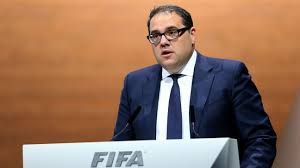By Paul Nicholson
April 16 – Concacaf president Victor Montagliani has said that the confederation is committed to completing the Final 4 play-offs to decide its first Nations League champions, but that it will likely have to rethink the qualification process for its 2022 World Cup qualifiers.
Speaking to Insideworldfootball last night, Montagliani emphasised that, public health issues surrounding Covid-19 allowing, the priority for getting football played in his region has to be first to get leagues back playing.
“For many of our stakeholders the season has barely started, particularly in North America and Central America. We need to get the domestic seasons up and running first,” he said.
Even so, he pointed out that currently “the international window in September is still on the books” and even if that date does look precarious, he sees enough “flex” to get some games played.
The completion of the Nations League would be the priority. “We are 100% committed to the Final 4. It is actually the easiest of our events to fit in because we really only need a clear weekend with semi-finals on a Thursday and finals on the following Sunday,” said Montagliani. The Nations League’s second iteration is not scheduled to start until November 2021.
2022 World Cup qualification creates more issues. Currently the qualifying teams for the play offs for the finals would be decided on FIFA rankings – six highest ranked teams playing off for three full slots starting this autumn. But Montagliani points to a potential sporting integrity issue that needs to be addressed.
“I think we will be looking at other models for qualifying,” he said. “The FIFA rankings in June were going to decide the qualifiers but we will have lost 104 games in that March to June period. A lot of nations were planning friendlies to try and pushes their FIFA rankings but we will have to look at reformatting qualification. There is a hint of sporting integrity in this.”
The deadline for the final 2022 World Cup qualification place for Concacaf is not until March 2022 when the final qualifying Concacaf team would face a challenger from Oceania in the intercontinental play-off.
“At the moment we would be unlikely to have to move that as there is enough flex (in the calendar) between now and end 2021 to get a qualification schedule played and keep everybody to that date,” said Montagliani. “If we start September and end October 2021 we have November for our play off to decide who goes forward to face the OFC challenger.”
The summer of 2021 will also be the next edition of the expanded 16-team Gold Cup, Concacaf’s blue riband senior men’s championship. Qualification for the Gold Cup needs to be completed and it may be that somewhere within that a solution to World Cup qualification exists.
Gold Cup qualification is trickier as it requires more dates. “For example, we have home and away qualifiers for C1 and B2 (group positions) and then the winner of A3. We need six match dates just for them. We might have to modify that schedule, perhaps bringing teams to a central location. Again, it is about keeping the sporting integrity of everything.”
A global approach
While Montagliani is at the centre of guiding the reworking of his own confederation’s international schedules, he has also had a leading role as chair of the FIFA stakeholders committee that has been looking at wider global measures to help the calendar.
“Ironically it might be a blessing in disguise that the World Cup in 2022 is in December rather than June. It gives us a few more options to look at. There are working groups and we will make the decisions globally as confederations on how it all fits in and with respect to the different local structures.”
An early measure coming out of this group was FIFA’s movement of player contracts and transfer windows to accommodate a later finish to domestic seasons without dramatically altering the look of teams in leagues where there is highly mobile player movement between clubs.
What happens in the next month or two could potentially prove to lead to a long term reshaping of the international calendar.
“We started a working group (at FIFA) in January as there was a need to start work on the calendar post 2024. What looked like being an opportunity to bring in some different ideas – particularly around better health for players and travel – might be a short term solution for 2020…
“People think the only issue is calendar congestion. That is true in Europe and in some parts of other confederations. But in other parts of the world one if the issues of the calendar is that there is not enough (competitive international football). We have got to find a balance. I think with our Nations League in Concacaf we have a perfect example of that.”
Contact the writer of this story at moc.l1745339555labto1745339555ofdlr1745339555owedi1745339555sni@n1745339555osloh1745339555cin.l1745339555uap1745339555

